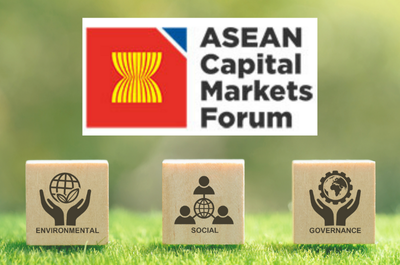Small and medium enterprises (SMEs) in the Philippines and other ASEAN countries now have a handy tool to make Environmental, Social, and Governance (ESG) reporting easier and boost their role in global sustainable supply chains.
The ASEAN Capital Markets Forum (ACMF) has published the “ASEAN Simplified ESG Disclosure Guide (ASEDG) for SMEs in Supply Chains,” an ESG reporting guide for SMEs in the region that operate within global and local supply chains.
Briefly, the guide simplifies ESG reporting for ASEAN businesses, which often struggle with limited resources and find global frameworks too complex. This tool is important as transparency and accountability in ESG practices become a critical requirement for SMEs to continue participating in the global business world.
“Reporting can be complex and resource-intensive, particularly for smaller businesses. This guide has been designed to simplify ESG disclosures and ensure alignment with global standards,” said ACMF, a grouping of capital market regulators from the 10 ASEAN jurisdictions, in a foreword to the guide.
“It seeks to empower SMEs to assess and grow their sustainability value, enhance supply chain resilience, and attract investment.”
Today ESG adoption is not just about compliance but has evolved into a strategic necessity. “Companies that proactively embed sustainability into their operations will gain a competitive edge in national, regional and international markets,” ACMF said.
They will also be able to future-proof their businesses, mitigate risks, and build long-term value.
This simplified reference framework streamlines and consolidates various global ESG frameworks as well as the local guidelines and frameworks of ASEAN member states into a set of 38 priority disclosures recommended for SMEs to address.
Released in April 2025, the ASEDG helps businesses begin their ESG reporting in a structured and accessible way, and is categorized into basic, intermediate and advanced to cater to the different levels of sustainability maturity of each SME.
The disclosures are applicable across all industries with different levels of priority, and SMEs are encouraged to determine the significance and relevance of these disclosures to their companies.
ASEDG focuses on three core areas: environmental, social and governance disclosures. These are further divided into 15 practical topics that capture a company’s sustainability-related risks, opportunities, and performance.
The environmental disclosure section guides SMEs in tracking their environmental impact. Topics under it center on emissions, energy, water, waste, and materials.
By reporting on these, businesses can reduce their environmental footprint and align with sustainability goals, according to a report from Fuller Academy, a Kuala Lumpur-based sustainability course provider.
The social disclosure pillar addresses how SMEs interact with their employees, customers and suppliers, and the communities they operate in. It covers human rights and labor practices; employee management; diversity, equity and inclusion; occupational health and safety; and community engagement.
Reporting on social factors builds trust with stakeholders and enhances a company's reputation. It also ensures that SMEs are contributing to fair, inclusive, and safe working environments throughout the supply chain.
Governance focuses on how SMEs are managed and how decisions are made to ensure transparency, accountability, and ethical conduct. The topics cover governance structure, policy commitments, risk management and reporting, anti-corruption, and customer privacy.
Strong governance practices protect a company’s reputation while also ensuring long-term business success by showing investors, customers, and partners that the company is committed to responsible and sustainable business practices.
The ASEDG may be accessed at www.theacmf.org/images/downloads/pdf/ASEDG%20100425.pdf.
Published: May 30, 2025
June 05, 2025













